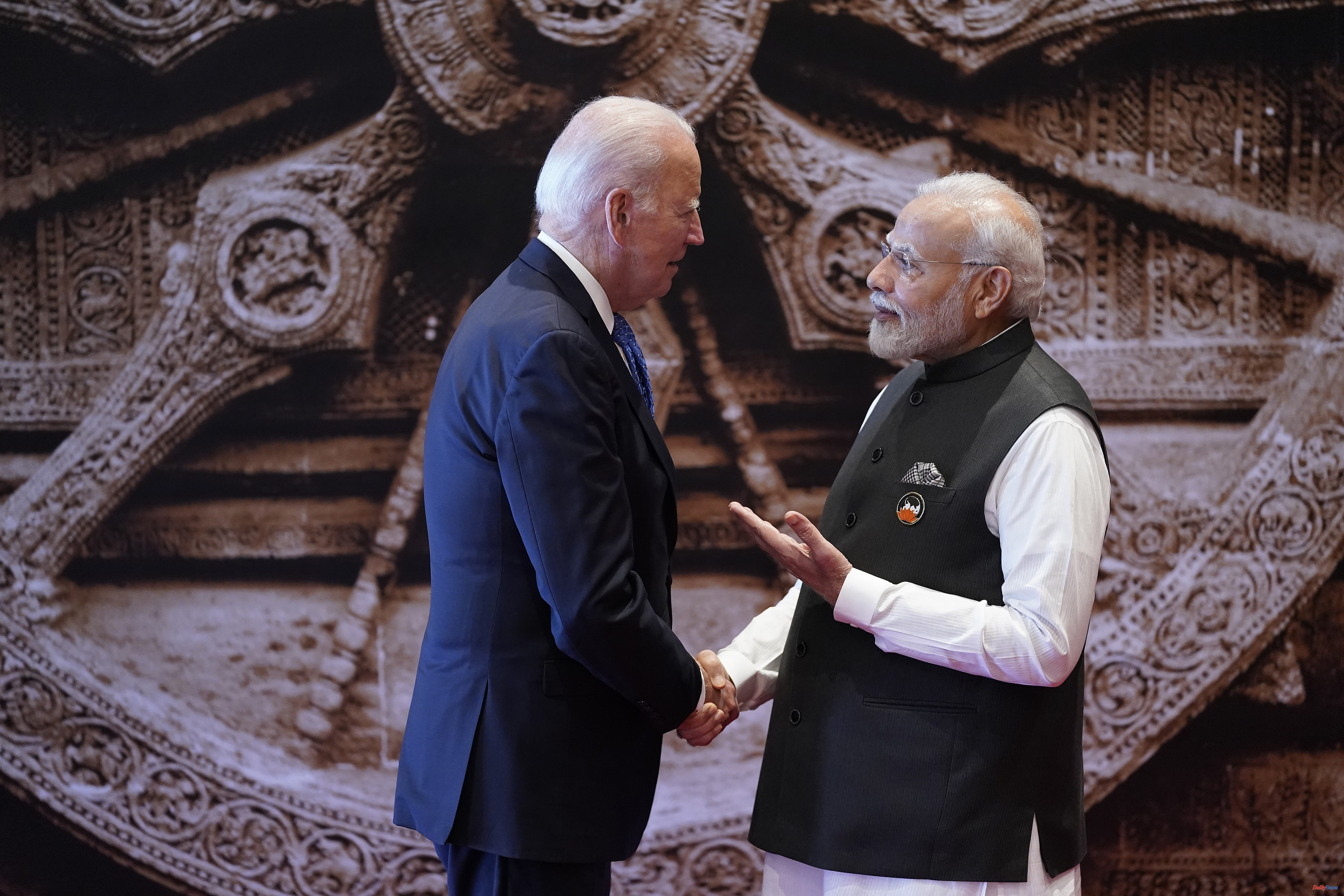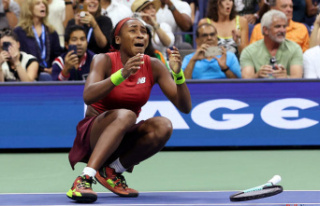"One Earth. One family. One future." India searched an ancient Sanskrit text to come up with this motto for the G-20 summit. Some words that appear on large posters spread throughout New Delhi and whose message of unity is far removed from the reality faced by a summit that is more divided than ever. Despite everything, the host of the meeting, Prime Minister Narendra Modi, announced on Saturday that "there is a consensus" among the leaders to issue a joint statement that sets aside some differences on the issue on which they differ most: war. in Ukraine.
The G-20, one day earlier than expected, published a 37-page joint statement that addresses different issues, starting with the war in Ukraine: it reiterates support for the UN resolution that opposes Russian aggression, but the statement is much softer than last year's.
At the 2022 summit in Bali, the group said it "deplores in the strongest terms the aggression of the Russian Federation against Ukraine and demands its complete and unconditional withdrawal from the territory of Ukraine." In Delhi, leaders have avoided using these terms. They are not even calling for the withdrawal of Russian troops.
In reference to war, the document notes that "all states should refrain from the threat or use of force to seek territorial acquisitions against the territorial integrity and sovereignty or political independence of any state." At no point is the Russian attack explicitly pointed out, unlike last year.
"Bali was Bali and New Delhi is New Delhi. You don't have to take a theological view on this. The statement responds to today's concerns and situation, just as the Bali statement responded to last year's situation," justified in a press conference the Minister of Foreign Affairs of India, Subrahmanyam Jaishankar.
In the run-up to the marathon of meetings there was a lot of noise about whether it could be the first time that there was no final document at a G-20 summit. "Moscow will block the final declaration if it does not reflect its position," was the order launched a few days ago by the Russian envoy to Delhi, Foreign Minister Sergei Lavrov. Some analysts believe that the group has finally given in to pressure from Moscow, which had the support of Beijing, to tone down the tone in the final statement.
With Vladimir Putin hiding again in the Kremlin to avoid international scrutiny, there was no doubt that the Russian invasion of Ukraine would mark much of the weekend's agenda. Prime Minister Narendra Modi was well aware of this, whose growing geopolitical influence was being tested to seek consensus and launch a declaration with a single voice. Although he hasn't had it easy.
While Western leaders were betting on a forceful and harsh condemnation of the Russian attack, the Kremlin had found support from China to block the diplomatic slap.
The statement does make clear that "the use or threat of use of nuclear weapons is inadmissible," referring to Putin's announcement in March that he would deploy tactical nuclear weapons in Belarus. The group also called on Russia and Ukraine to "ensure immediate and unhindered deliveries of grain, food and fertilizers," emphasizing the importance of maintaining food and energy security.
The summit started with a few words from Modi talking about the "crisis of confidence" that the world is suffering. "The war has deepened this trust deficit. If we can defeat Covid, we can also defeat this crisis of mutual trust," said the Indian.
In his speech there was a detail that did not go unnoticed: on the label that identifies the countries and that Modi had on his table, it did not say India, but Bharat, one of the official names of the country, which dates back to an ancient text. Sanskrit. The prime minister's ultra-nationalist supporters and some parliamentarians from his party defend the name change as a break with Britain's colonial past.
The final document published addresses the countries' commitments on issues such as the need for a reform of multilateral development banks or allocating four trillion dollars of financing annually for the energy transition, as well as establishing strict regulation for cryptocurrencies and artificial intelligence. .
From Europe they tried to get the Ukrainian president, Volodymyr Zelensky, to also be in Delhi as a guest, or to at least appear by videoconference as happened at the 2022 summit in Bali, when, despite the divisions, the group published a final statement emphasizing in the different points of view that there are about war.
A few months ago, kyiv, with the support of its European partners, formally requested to participate in the summit, but the Modi government rejected it. This was the reason revealed a few days ago by Foreign Minister Subramanyam Jaishankar: "The G-20 is a group that deals with the problems of global economic growth and development. This is a summit to discuss energy issues and food proposals, not the UN Security Council."
Charles Michel, president of the European Council, has said that what the European Union wants is for the G-20 leaders to pressure Putin to withdraw from Ukraine and rejoin the Black Sea grain deal because its blockade has caused insecurity. food for more than 250 million people around the world. "This meeting is an occasion to see Russia's cynical approach, which is creating more difficulties for developing countries," Michel noted.
G-20 member states account for more than 80% of global economic output, 60% of the population and 75% of trade, but the group has long been criticized for failing to address issues that disproportionately affect the developing countries. India, as the host and rotating chair of the group, pledged to use position to highlight the demands of its colleagues from the so-called Global South.
Modi has said his goal is to forge unity on big global issues such as climate change, food security and debt relief for poor nations. A key move of this year's summit has been the formal joining of the African Union group. This continental body of 55 member states already has the same status as the European Union, leaving behind its designation as an invited international organization.
Another prominent role at the summit, as expected, will be played by the United States. President Joe Biden will not be able to hold an expected bilateral meeting with the Chinese Xi Jinping, the other major absentee from the event. It was a good opportunity to bring positions closer together in the midst of the continuous tension between the two main world powers. From Washington they have pointed out that Biden will present a proposal to reform the World Bank and boost loans for infrastructure and climate change projects.
"That is one of our main objectives for the G-20: to fulfill an agenda that fundamentally remodels and expands the multilateral development banks," said White House national security advisor Jake Sullivan, who spoke about a proposal that includes a sovereign debt restructuring for low- and middle-income countries that could ultimately mobilize more than $200 billion, starting with an initial $25 billion backed by the US Congress.
A move that many analysts have interpreted as an attempt by Washington to offer an alternative to China's new Silk Road, the mega infrastructure project sponsored by Xi Jinping.
On the sidelines of the summit, one of the most prominent infrastructure deals expected to close this weekend involves India, the United States and Saudi Arabia to reconfigure trade between the Gulf and South Asia, uniting the countries from the Middle East by rail and connecting to India by port, which would reduce shipping times and costs and diesel usage.
Reuters has advanced that these plans, in which the United Arab Emirates and the European Union also participate, are another push led by Washington to counter Beijing's global infrastructure push.
This year's G-20 has kicked off at the remodeled Bharat Mandapam, a mega convention center that was renovated in July and features a conch-shaped main building. Among the leaders who began the meetings on Saturday is not the Spanish president Pedro Sánchez, who announced on Thursday that he had tested positive for Covid. Representing Spain is the Minister of Economy, Nadia Calviño, and the Minister of Foreign Affairs, José Manuel Albares.
In India, one of the most commented visits by the local media has been that of Rishi Sunak, the first British minister of Indian descent to set foot in the country, at a time when the Modi Government is taking steps to erase much of of the colonial legacy.
Sunak is in Delhi accompanied by his wife Akshata Murty, who was born and raised in India and is the daughter of one of the country's richest men. Throughout the summit the British leader will hold a bilateral meeting with his Indian counterpart to discuss a free trade agreement between both nations.
Next to the epicenter of the leaders' meetings is also the complex converted into the media center, which houses more than 3,000 journalists from all over the world. The great media interest in the largest political forum that provides a unique opportunity for global cooperation on fundamental issues such as the climate crisis after a summer of record temperatures and floods is indisputable.
"G-20 leaders can stop climate collapse, they have the power to restore a climate crisis that is spiraling out of control, but the rules must change, above all we must reform the global financial rules, which are obsolete and unfair "said the Secretary General of the UN, Antonio Guterres, who also participates in the summit as a guest. "The climate crisis is worsening dramatically, but the collective response lacks ambition, credibility and urgency."
In the joint statement, the leaders said they would support efforts to triple global renewable energy capacity by 2030, also calling for accelerating projects to phase out coal-based power.
The group added that it will work to facilitate low-cost financing to support developing countries' low-carbon transition. But the declaration, despite calls from international climate bodies, contains no promise to phase out fossil fuels.












